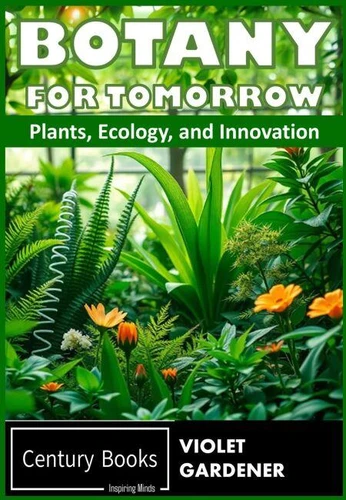Botany For Tomorrow
Par :Formats :
Disponible dans votre compte client Decitre ou Furet du Nord dès validation de votre commande. Le format ePub protégé est :
- Compatible avec une lecture sur My Vivlio (smartphone, tablette, ordinateur)
- Compatible avec une lecture sur liseuses Vivlio
- Pour les liseuses autres que Vivlio, vous devez utiliser le logiciel Adobe Digital Edition. Non compatible avec la lecture sur les liseuses Kindle, Remarkable et Sony
- Non compatible avec un achat hors France métropolitaine
 , qui est-ce ?
, qui est-ce ?Notre partenaire de plateforme de lecture numérique où vous retrouverez l'ensemble de vos ebooks gratuitement
Pour en savoir plus sur nos ebooks, consultez notre aide en ligne ici
- FormatePub
- ISBN8230339526
- EAN9798230339526
- Date de parution17/11/2024
- Protection num.Adobe DRM
- Infos supplémentairesepub
- ÉditeurIndependently Published
Résumé
Botany for Tomorrow: Plants, Ecology, and Innovation is an essential guide to the world of plants, delving deeply into the fascinating science of botany and its applications in a changing world. This comprehensive volume explores the biological, ecological, and technological aspects of plants, offering readers insights into everything from plant cell structure to complex ecological relationships and the cutting-edge innovations shaping the future of plant science.
Each chapter provides a blend of foundational knowledge and applied science, covering topics such as plant physiology, genetics and biotechnology, conservation strategies, and sustainable agricultural practices. Rich in detail and accessible to readers of various backgrounds, the book includes case studies, practical experiments, and detailed plant profiles to bring the science of plants to life. Whether understanding the latest advancements in CRISPR gene editing, exploring urban greening and green infrastructure, or examining the role of plants in mitigating climate change, readers will find themselves immersed in both the science and the societal importance of plants.
Designed for students, educators, professionals, and plant enthusiasts, Botany for Tomorrow equips readers with the tools to understand and engage with the role of plants in addressing global challenges, from food security to biodiversity loss. As we look toward the future, this book provides an inspiring, science-backed perspective on the indispensable role of plants in our world-and how their study can lead to sustainable solutions for generations to come.
Each chapter provides a blend of foundational knowledge and applied science, covering topics such as plant physiology, genetics and biotechnology, conservation strategies, and sustainable agricultural practices. Rich in detail and accessible to readers of various backgrounds, the book includes case studies, practical experiments, and detailed plant profiles to bring the science of plants to life. Whether understanding the latest advancements in CRISPR gene editing, exploring urban greening and green infrastructure, or examining the role of plants in mitigating climate change, readers will find themselves immersed in both the science and the societal importance of plants.
Designed for students, educators, professionals, and plant enthusiasts, Botany for Tomorrow equips readers with the tools to understand and engage with the role of plants in addressing global challenges, from food security to biodiversity loss. As we look toward the future, this book provides an inspiring, science-backed perspective on the indispensable role of plants in our world-and how their study can lead to sustainable solutions for generations to come.
Botany for Tomorrow: Plants, Ecology, and Innovation is an essential guide to the world of plants, delving deeply into the fascinating science of botany and its applications in a changing world. This comprehensive volume explores the biological, ecological, and technological aspects of plants, offering readers insights into everything from plant cell structure to complex ecological relationships and the cutting-edge innovations shaping the future of plant science.
Each chapter provides a blend of foundational knowledge and applied science, covering topics such as plant physiology, genetics and biotechnology, conservation strategies, and sustainable agricultural practices. Rich in detail and accessible to readers of various backgrounds, the book includes case studies, practical experiments, and detailed plant profiles to bring the science of plants to life. Whether understanding the latest advancements in CRISPR gene editing, exploring urban greening and green infrastructure, or examining the role of plants in mitigating climate change, readers will find themselves immersed in both the science and the societal importance of plants.
Designed for students, educators, professionals, and plant enthusiasts, Botany for Tomorrow equips readers with the tools to understand and engage with the role of plants in addressing global challenges, from food security to biodiversity loss. As we look toward the future, this book provides an inspiring, science-backed perspective on the indispensable role of plants in our world-and how their study can lead to sustainable solutions for generations to come.
Each chapter provides a blend of foundational knowledge and applied science, covering topics such as plant physiology, genetics and biotechnology, conservation strategies, and sustainable agricultural practices. Rich in detail and accessible to readers of various backgrounds, the book includes case studies, practical experiments, and detailed plant profiles to bring the science of plants to life. Whether understanding the latest advancements in CRISPR gene editing, exploring urban greening and green infrastructure, or examining the role of plants in mitigating climate change, readers will find themselves immersed in both the science and the societal importance of plants.
Designed for students, educators, professionals, and plant enthusiasts, Botany for Tomorrow equips readers with the tools to understand and engage with the role of plants in addressing global challenges, from food security to biodiversity loss. As we look toward the future, this book provides an inspiring, science-backed perspective on the indispensable role of plants in our world-and how their study can lead to sustainable solutions for generations to come.



